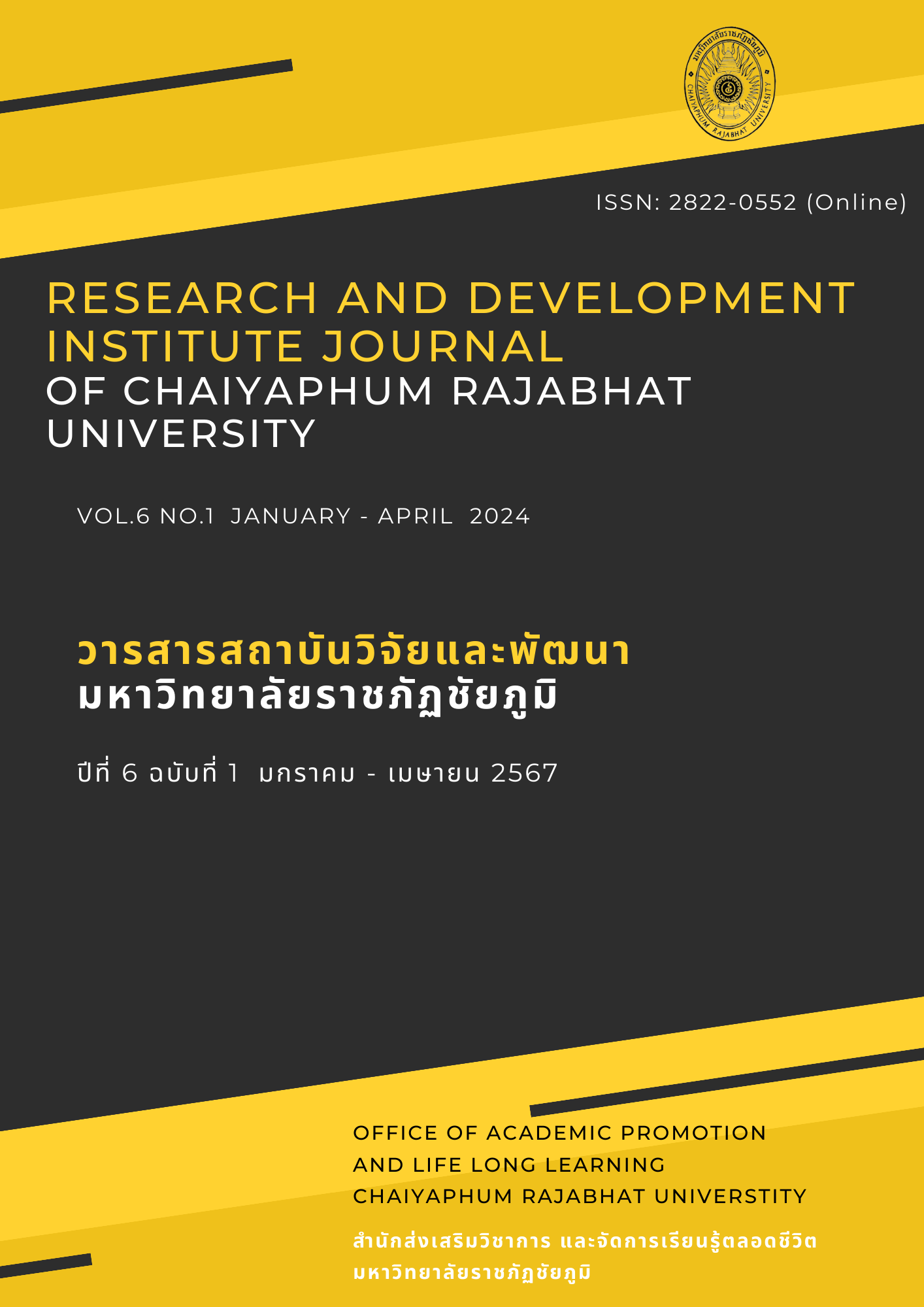THE DEVELOPMENT OF READING AND SPELLING SKILLS ON THAI SUBJECT FOR PRATHOMSUKSA 1 STUDENTS USING BRAIN - BASED LEARNING
Main Article Content
Abstract
The purposes of this research were to 1) develop the lesson plans using Brain-Based Learning approach of Prathomsuksa 1 students to an efficiency criteria of 80/80,
2) compare the learning achievement of Prathomsuksa 1 students before and after learning using Brain-Based Learning approach, and 3) compare the reading and spelling skills on Thai subject of Prathomsuksa 1 students before and after learning using Brain-Based Learning approach. The research sample consisted of 17 participants of Prathomsuksa 1 students in the first semester, of the academic year 2023 at Ban Non-Samran School, obtained by simple random sampling. The instruments in this research were 1) the reading and spelling skills using BBL lesson plans, 2) the reading and spelling skills achievement test, and 3) the performance reading and spelling skills test. The statistics used to analyze the data were mean, standard deviation and tested the hypothesis by t-test dependent samples.
The results of this study are as follow:
1) The lesson plan for reading and spelling skills on Thai subject of Prathomsuksa 1 students had an efficiency of 85.67/84.71.
2) The learning achievement on Thai subject of Prathomsuksa 1 students after using Brain-Based Learning Approach was significantly higher than before at .05 level.
3) The reading and spelling skills on Thai subject of Prathomsuksa 1 students using Brain-Based Learning approach was significantly higher than before learning at the 0.05 level.
Article Details

This work is licensed under a Creative Commons Attribution-NonCommercial-NoDerivatives 4.0 International License.
Permission to use text, content, images, etc. of publication. Any user to read, download, copy, distribute, print, search, or link to the full texts of articles, crawl them for indexing, pass them as data to software, or use them for any other lawful purpose. But do not use it for commercial use or with the intent to benefit any business. Published under a Creative Commons Attribution-NonCommercial-NoDerivatives 4.0 International License.

This work is licensed under a Creative Commons Attribution-NonCommercial-NoDerivatives 4.0 International License
References
กระทรวงศึกษาธิการ. (2553). หลักสูตรแกนกลางการศึกษาขั้นพื้นฐาน พุทธศักราช 2551 (พิมพ์ครั้งที่ 3). กรุงเทพฯ: โรงพิมพ์ชุมนุมสหกรณ์การเกษตรแห่งประเทศไทยจำกัด.
กระทรวงศึกษาธิการ. (2564). ประกาศกระทรวงศึกษาธิการ เรื่อง นโยบายและจุดเน้นประจำปีงบประมาณ 2565. กรุงเทพ: กระทรวงศึกษาธิการ.
พรพิไล เลิศวิชา. (2558). Roadmap…..การพลิกโฉมโรงเรียน ป.1 อ่านออกเขียนได้ ใน 1 ปี. กรุงเทพฯ: สำนักงานคณะกรรมการการศึกษาขั้นพื้นฐาน.
พรพิไล เลิศวิชา และอัครภูมิ จารุภากร (2550). ออกแบบกระบวนการเรียนรู้โดยเข้าใจสมอง. กรุงเทพฯ: ด่านสุทธาการพิมพ์ จำกัด.
ไพวรรณ ชาติผา (2556). การพัฒนาการอ่านและการเขียนคำที่มีตัวสะกดไม่ตรงมาตราโดยใช้แบบฝึก กลุ่มสาระการเรียนรู้ภาษาไทย ชั้นประถมศึกษา ปีที่ 2. วารสารบัณฑิตศึกษา. 10(49), 133-140.
มธุรดา ท่าช้าง. (2554). การสอนอ่านจับใจความตามแนวการเรียนรู้โดยใช้สมองเป็นฐานที่มีต่อความสามารถทางการเขียนสรุปความของนักเรียนชั้นประถมศึกษาปีที่3. [การศึกษาค้นคว้าอิสระปริญญามหาบัณฑิต]. มหาวิทยาลัยเชียงใหม่.
เลขา มากสังข์. (2556). การจัดการเรียนรู้โดยใช้สมองเป็นฐานที่มีต่อความสามารถในการเขียนเชิงสร้างสรรค์ภาษาไทยของนักเรียนชั้นประถมศึกษาปี ที่ 3 โรงเรียนบ้านทุ่งนารี อำเภอป่าบอน จังหวัดพัทลุง. [การศึกษาค้นคว้าอิสระปริญญามหาบัณฑิต]. มหาวิทยาลัยเชียงใหม่.
สริตา ลีปรีชา. (2564). การพัฒนาความสามารถการอ่านออกเสียงตัวสะกดไม่ตรงมาตรา แม่กด โดยใช้กิจกรรมการเรียนรู้ตามแนวคิดสมองเป็นฐาน ของนักเรียนชั้นประถมศึกษาปีที่1. [วิทยานิพนธ์ปริญญามหาบัณฑิต]. วิทยาลัยครูสุริยเทพ.
สำนักงานเขตพื้นที่การศึกษาประถมศึกษาชัยภูมิเขต 3. (2565) รายงานการประเมินความสามารถด้านการอ่านของผู้เรียน (RT) ปีการศึกษา 2564. ชัยภูมิ: สำนักงานเขตพื้นที่การศึกษาประถมศึกษาชัยภูมิ เขต 3.
Hoge, P. T. (2003). The integration of brain-based learning and literacy acquisition. New York: W.H Freeman.
Jensen, E. (2000). Brain-based learning. San Diego, CA: The Brain Store Publishing.


